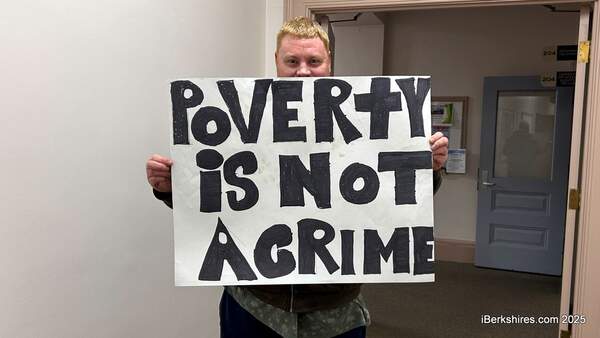Pittsfield Mayor Open to Level/Service Funded Budget
PITTSFIELD, Mass. — Mayor Peter Marchetti won't support the sacrifices a level-funded city budget would entail but is willing to compromise.
Early in the term, the City Council supported a divisive petition requesting a budget that is "close to level-funded" due to concerns about tax increases. This would come with cuts to employment and city services, the mayor warned, but the administration is working to create a proposal that is "between level funded and a level service funded."
"As all of you remember, only seven days into my term of office I was presented a petition looking for a level-funded budget," Marchetti said during his biweekly television show on Monday.
"We have continued to work on a budget that shows what I think will be the desires of Pittsfield."
He explained that a level-funded budget could mean the closure of a fire station on either a permanent or rotating basis and laying off 11 police officers and more than 100 school personnel.
"As I've said before, that's not acceptable to me so we're continuing to find a budget that is somewhere between a level-funded and level service-funded budget that provides the services to people of Pittsfield without really raising their taxes by a large amount of money," he said.
"Please recognize that we're in the early stages of budget planning and it is my intent to present to the City Council my budget for the first meeting in May."
The mayor has asked department heads to provide three types of budgets: a level-funded budget, a level service-funded budget, and a list of things that would make the city better if they could be afforded.
He will host a joint meeting with the council and School Committee on April 2 when they will talk about the financial overview of the city and how it rates in terms of taxes, average assessed value, and average tax bill throughout Berkshire County and similar cities.
The district's $80 million proposal for fiscal year 2025 includes the reduction of more than 100 staff members due to a shortfall of funds.
Much of the impact on the budget is attributed to the September sunsetting of the federal Elementary and Secondary School Emergency Relief funds that were created in response to the COVID-19 pandemic and not as much in state Chapter 70 education funding as in previous years.
For FY25, the district anticipates a 3.5 percent increase from this year's budget appropriation totaling $80,821,096, about $2.7 million more. With anticipated contractual increases and other spending obligations reaching more than $6.4 million, a local budget shortfall of almost $3.7 million is anticipated not including the discontinued ESSER funds. That $3.7 million gap has brought a proposal for a level number of reductions.
Last week, the School Committee supported a resolution to seek a full inflation adjustment of Chapter 70 school aid for FY25. Due to a decrease in the percentage of low-income students, the district is being docked $2.3 million after missing the cutoff for a higher reimbursement group by 0.04 percent.
"As you may know, the City of Pittsfield last year received $6.7 million in additional Chapter 70 money and this year, that funding is only $649,000 of additional funding," Marchetti explained.
"So you can see a major gap in funding there. And so, we're gonna do what we can to support the efforts to improve that situation."
The resolution states that the application of a cap on the foundation inflation index that limits each annual adjustment to no more than 4.5 percent when inflation exceeds that amount has reduced the base used to calculate foundation budgets for fiscal year 2025 and future years by about 6 percent below what is needed to maintain the purchasing power of Massachusetts schools.
Because of this, it states that a legislative change is needed (1) to fully reflect recent inflation in the Chapter 70 definition of the foundation inflation index for fiscal year 2025 and (2) to eliminate the cap in future years to restore the purchasing power of district foundation budgets to reflect the intended resource allocations of the Student Opportunity Act.
Formal talk of a level-funded budget began at the first council meeting of the term when a petition from Councilor at Large Kathy Amuso requested the presentation of a budget that is "close to level-funded" was approved 7-4 with President Peter White, Councilors at Large Alisa Costa and Earl Persip III, and Ward 7 Councilor Rhonda Serre voting in opposition.
Amuso explained that during her previous terms on the School Committee and the council, approving the budget was always the worst meeting. She is stunned by tax rate increases and wants the city to take immediate action in preparation for the fiscal 2025 budget season.
The FY24 budget of $205,584,497 was almost $17 million, or 8.9 percent, higher than the previous year's budget of $188,822,018.
It broke down into $109,300,895 for city operations, $78,088,016 for the School Department, and $18,195,586 for the enterprise which includes the Department of Public Utilities water treatment, sewer, and wastewater.
Tags: fiscal 2025, pittsfield_budget,
















